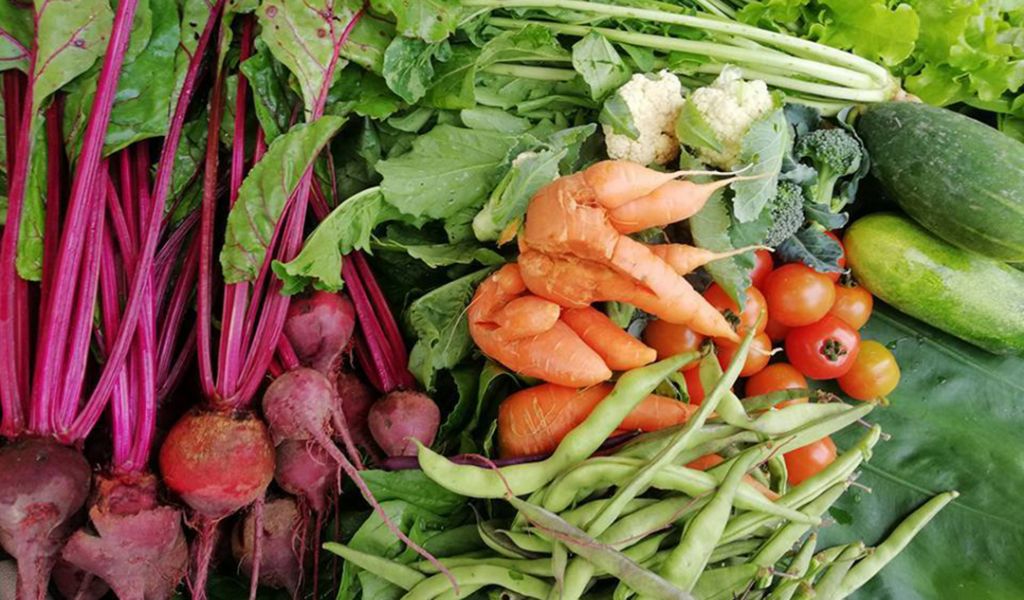How to start an organic vegetable business

We talked with Ken Phidsaphaeng, a 28-year-old young man, who runs Green Organic Farm in, Ban Phavieng, Luang Prabang — and he plans to retire at the age of 35!
1. How did you decide to become an organic vegetable farmer?
I’ve always dreamed about having a nice car, owning a restaurant, and just having a lot of money in general. Then, a few years ago, I got the chance to go to Australia and my boss at the time said something that stuck with me, “People in Australia are farmers but they are not poor people”. That got me thinking. I still wanted everything I had dreamed of but I also knew I’d be happiest back in my hometown making a business out of what my parents had done. Farming. So, I quit my job in Vientiane, returned to Luang Prabang, and started an or-ganic farm on my father’s land. At the beginning, I didn’t actually know a lot about farm-ing. So, before planting my first vegetables, I hired a technical advisor for 6 months to teach me how to grow vegetables. I started by growing local vegetable like lettuce, morning glory, cucumbers, lemon grass, galangal and now we grow more 10 types of different vegetables lettuces, baby spinach, tomatoes, broccoli, egg plants, cucumber, chili, beetroot, radish, cabbage, rocket, green onions.
2. What is organic vegetable farming like on a day-to-day basis?
I have about 2 hectares of land and I’ve hired two persons to work on the farm. We’ve learned that if you plant good quality seeds, germination is not a problem. The growing time for various vegetables is 45-60 days. We don’t sell vegetables that are past 75 days because they lose their flavor. We grow organic vegetables which means we don’t use any chemicals on our farm. Any leftover produces we have, we use to make compost and natural fertiliz-er. We’ve chosen to make our own fertilizer so we know what goes in it — and because it allows us to save some money. We have installed a watering system and during the rainy season we grow some of the vegetables in greenhouses.
3. What does one need to do to start an organic vegetable business?
• Ideally, you should know about growing vegetables before you start.
• You need land, for example land that your parents or a family member is willing to let you use.
• Plan carefully before you plant anything and be sure to understand what vegetables are in demand locally.
• Then you just have a go at it and keep learning as you go. If you only plan and plan but don’t ever start, nothing will ever come of it!
4. How much does it typically cost to get started?
If you start with a small plot, it does not cost much. You need to buy some seeds and gar-dening equipment, and to invest in a watering system. You can either use seeds that are na-tive varieties or buy foreign ones from a shop. You should be able to get everything you need for about 1 million Kip. Of course, the cost will be more depending on how large of an area you intend to farm.
Personally, I invested a lot of money in this farm, about 100 million Kip. I spent some of that on a watering system and the rest on making this place attractive for tourists. From the start, I’ve had plans to make this farm into a tourist attraction. Currently, I am in the process of planning to offer tours of the farm to travelers, opening a small restaurant with a space for cooking lessons, and establishing a garden park.
5. How much income do you earn from this activity?
We advertise on Facebook and sell our vegetables to restaurants, hotels, and foreigners liv-ing in Luang Prabang. Our biggest buyers are restaurants. Hotels order our vegetables too but their orders fluctuate based on the tourist seasons. We also sell vegetable baskets to for-eigners who are living in Luang Prabang for 50,000, 80,000 and 120,000 kip per basket; I earn about 700,000 kip per week from that, around 3,500,000 – 4,000,000 kip per month.
6. What are the biggest challenges of organic vegetable farming?
Some of the vegetable varieties in Laos and Thailand are vulnerable to pests. Another chal-lenge is to figure out the right production techniques for different vegetable varieties. Many of them have different soil, water and shade requirements. I’ve had to invest a lot of time into learning how to keep our vegetables healthy.
From the beginning we’ve also faced stiff competition from other organic farmers who have the same target markets. However, we are trying to move from competition to collabo-ration so that we can share the benefits of the demand for organic produce. For example, if another farm does not have a certain vegetable, they can buy it from us. Currently the situ-ation is improving, we are sharing benefits more than we are competing each other.
7. What’s the best thing about being an organic vegetable farmer?
I enjoy seeing the vegetables grow. I also like the technical side of production as well as marketing and general management of the farm – all of which are very different types of tasks!
